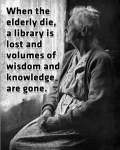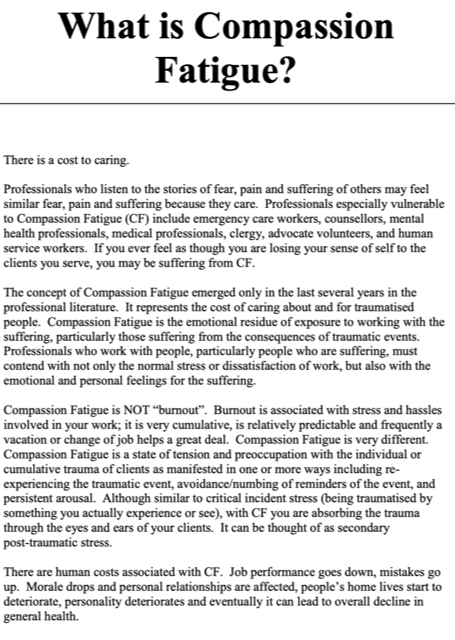Caregiving For All: October 14, 2024, Del Larson, Certified Lay Minister
I’m sure you have heard the expression: “Give a person a microphone and he will talk all night.” Well, the keyboard is my microphone, and this email is much longer than I want it to be, but I am aware of your time and do not want to overload you. So, for this one email, NO test will be given. Forgive me for being a little long. I hope my latest experiences will be helpful to you. September started when I was hacked on THE Google website. I lost most of my caregiving research and work, along with many other files off my desktop. If a semi-truck and trailer were what was lost, I was able to recover only about a pickup load. If you feel you are hacked turn off the computer immediately.
You might have thought I had forgotten you or walked away. My memory is slipping, but I never walk away from those things that are so important to me and others. It’s amazing how much I have learned in the past month about caregiving. Just this morning I was visiting my wife, Luann. who is now back in her apartment, after a two-week hospital and rehab stay because of choking and aspiration pneumonia, when her new OT person asked her this question, “What is the most important factor for you that would help you to enjoy your senior years?” Luann chose “socialization.” The therapist told her that was the most popular answer! The therapist shared she had thought it would be physical fitness and health. Socialization ties in with what I have been working on and sharing since spring. Senior loneliness is at a pandemic level. I’m still learning. Luann’s assisted living facility always has something going on, compared to my 55+ community with just coffee time, a couple of card games, and a potluck twice a month. No wonder she is thriving. She is not an introvert now.
In my online group, five of the seven have moved loved ones into nursing facilities, and the other two are actively seeking spots for their loved ones. I have heard from two in this email group and another friend who also made that same move. I believe that people seek and learn from the experiences of others. I am so glad that sharing our experiences in May and June helped ease the burden of being separated, and it has helped a few others.
Let me be clear, not every transition is successful. I have a couple of friends who pulled their loved ones out of a care facility, and I have seen a couple of care facilities shut down. You as the caregiver have to be vigilant and ask questions. In Luann’s situation of choking, the dining room aide didn’t seem to know what to do. Luann made the mistake of thinking she had cleared her throat like she normally does and went back to her apartment. She has these episodes about every 10-14 days, and the facility was aware. By raising her arms above her head and stretching, she can clear the obstruction most of the time. A few times a year she needs me to give her a hug which I adjust according to the situation. Everyone should know the Heimlich hug. When Luann got back to her apartment after choking, she called me and asked me to come over. I couldn’t quite understand her but was there in five minutes. She had not pushed her call button for help. I had her push it and tried to stretch her as I usually do, but nothing seemed to help release the pain in the chest. I did the hug, but nothing was helping. Her oxygen levels were dropping, so I had the staff call 911. She was hospitalized for five days, and in rehab for another eight days. She got physically weaker in the hospital which is common for seniors.
The Gastro doctor had to have an EGD test, which is a camera down the throat to check the esophagus and part of the stomach. Her last one was eight years ago, and she coded during the procedure, so she didn’t want it again. However, we needed that information, and she finally relented. She did very well. They found that her Muscular Dystrophy had weaken the muscles of the esophagus so that food does not move easily to the stomach. They put her on a soft diet but changed it when she left rehab. I am not happy about that decision and have made my concerns clear. Luann does struggle with memory at times. She has rules to follow for swallowing, but …. easily forgets. If she has another episode she will need to be on a mechanical soft diet until she may eventually have to go on a feeding tube.
As the caregiver, your role doesn’t end when they are in a nursing home or hospital. In the hospital, I asked for soap for her bathroom. After three days of asking for soap, on the third day, I told the nurse I would find someone, and I did. I asked them nicely to help me with the soap. It turned out to be a pinched tube in the dispenser. Now I know what to check next time. The nurse had called her charge nurse, but I asked her to call back and explain what it was. Don’t cause trouble until you have to. Being diligent without attacking gets you a lot further. People who are attacked tend to be more conservative and afraid to help. There are times that you need to be assertive, but again tell them, don’t yell at them. I made that mistake once when my very young granddaughter was in the ER three times in two days. I was angry and told the triage nurse so. Later while waiting for her test results, God hit me with a board and told me to apologize. I did and I took five minutes of being dressed down and shamed by the ER charge nurse. I deserved it and accepted it. God wouldn’t let me move. Now, I bring candy to every appointment and visit for the nurses, to make up for what I did. I’ve also learned to be positive with staff who are doing their best in hectic situations. Multiple hour waits in the ER are now the norm. Explain your concern. In my case wife Luann, the uncomfortable chairs bother my back. I ask for a better one.
I talked to the nurse at Luann’s care facility about clearing up the misunderstanding of what happened with Luann choking. I learned that aides are not to do anything other than call for a nurse. I informed her that in Minnesota’s Good Samaritan law, like all states, those who give aid are not responsible for their efforts. In some states, like Minnesota, a person can be fined $300 for not offering aid. Did I mention her big eyes? Also, this weekend, someone forgot to have a cook on duty, so residents were stuck with salads and deli sandwiches. I let them know that those meals are paid for, and I haven’t seen too many $17 salads. I did it in a caring way. Before you take this place off your list, Luann is very happy, and because of the socialization, she is doing much better. I wasn’t satisfied with the answer, so I talked with the director and expressed my concerns. I learned that the state doesn’t allow anyone but nurses and CNAs to offer assistance and that they must be trained, even though the ethics section on the next page of their manual states that all staff must aid residents in all situations. Can you guess what my next step was? I asked for copies of those pages. I will talk with my state legislators.
On a surprising and positive note for Luann, while in rehab she had to do some heart tests, as her MD affects her heart and eyes also. They found that she HAS NOT had any AFib moments in the past three months. She has been in her new home for three months. I know some of you are thinking it’s because she got away from me. I am very glad that she hasn’t had any AFib signs, but I’m still very crushed at the reasoning. Rather, I think this is because of where she is now living. I did everything I could to get her involved and make her happy. I offered to take her out for dinner, a movie, or whatever, but she declined because it was difficult for both of us. I didn’t want to go out by myself, and felt I needed to be with her. How could I have fun, when she was at home alone? I didn’t want her to eat alone. Now, she has everything in her complex, and she is very satisfied. The jury is still out on my satisfaction.
Quick thoughts on what I have learned in the last month that I will cover later:
- Based on percentages, who handles these types of transitions better, men or women? Why?
- How can you find out which facility is best for your loved one?
- What happens after your loved one is moved? How does the caregiver let go and find peace after the move?
I appreciate hearing from you. Positive or negative. My email is attached, or you can call the church, and they will give you my number.
Feel free to respond, ask questions, or tell me what you think.
I hope that you can find one thing that will be helpful to you. Email: larsondel@gmail.com
God bless you on your journey ahead.
A couple of links I recently received that got my attention because I feel I’m at that point.


